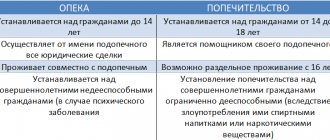Guardianship, trusteeship, patronage. What is the difference?
In a broad sense, all of these are synonyms. By this, most people understand caring about someone, their health and well-being. However, from the point of view of the legislation of the Russian Federation, these terms have differences.
Concept of legal capacity
In order for a person to fully enjoy his rights and interact with society, he must be legally capable.
Legal capacity is a person’s awareness of the rights and responsibilities assigned to him by law, the ability to fulfill them and take responsibility for the consequences. That is, these are the conscious actions of a person in society. A capable citizen serves himself, personally manages his income and makes any transactions regarding his property.
All adult citizens of the Russian Federation are considered legally competent unless the court finds otherwise. Those who cannot independently defend their rights due to age or health status are faced with limited legal capacity.
Based on the scope of legal capacity, Russian citizens are classified into one of the following categories:
- fully capable persons over 18 years of age;
- partially capable persons who are responsible for a number of their actions and have control over certain rights;
- persons with limited legal capacity by court decision;
- incompetent persons who do not realize the significance of their own actions.
To support these categories of the population, the state appoints assistants who take on legal protection and care for those in need.
Guardianship
Guardianship is a form of protection of the rights of children under 14 years of age left without parents, and people who are declared incompetent due to mental disorders or memory loss.
Guardians - monitor the maintenance, nutrition and health of the wards, live with them; - manage their income (benefits, pensions, alimony, etc.) and property under the control of the guardianship authorities; — act as legal representatives and protect the interests of wards in court, make transactions on their behalf, and are also responsible for their actions. In fact, they replace wards in legal relations with other persons.
The establishment of guardianship or other form of supervision of adults in Russia is regulated by the Civil Code and the Federal Law “On Guardianship and Trusteeship” No. FZ-48.
Typically, caring for someone in need falls on family members. But the guardian is not necessarily chosen from among the relatives. Any capable citizen or certain institutions can take care of them: medical, educational, educational or social protection institutions. The caregiver is appointed by a resolution of the state guardianship authorities, which issue the appropriate certificate.
Guardianship, with some exceptions, is a gratuitous activity. Also, the guardian does not become the heir of the ward solely on the basis of his caring status.
Guardianship
This is close to guardianship, but a narrower form of protecting the rights of wards. It is established in relation to partially or partially capable citizens who are to some extent responsible for their actions: - minors aged 14 to 18 years; - adults whose legal capacity has been limited by the state due to abuse of alcohol, drugs or gambling, which has worsened the financial situation of the family.
The trustee no longer replaces the ward in legal relations, as a guardian does. He only helps the person he is looking after to fully and correctly defend his rights. The citizen himself bears responsibility for the actions taken, and the trustee partially shares it in some cases.
In transactions, the trustee acts as a controlling person: the ward resolves small everyday issues himself, and large transactions take place only with the consent of the trustee. The trustee's responsibilities also include protecting the ward from fraudulent activity.
Just like guardians, trustees are appointed by the state. In both cases, the wards do not have a decisive vote in the choice, and also cannot refuse guardianship.
You cannot be a guardian and a trustee at the same time.
Patronage
For capable citizens, a form of support and legal assistance has also been developed - patronage. Its main feature is that it is established and terminated on a voluntary basis.
Typically, adults and elderly people with physical health problems who find it difficult to resolve household, financial and legal issues alone need patronage. They have the right to apply to the guardianship and trusteeship authorities with a request to appoint a carer for them. After reviewing the application, the guardianship authorities select a person who will regularly visit the ward and help him with housework, travel and transactions.
The rights and obligations of the parties are fixed in an agreement, which describes the entire scope of care services, the assistant’s work schedule, etc. And if an elderly person wants an assistant to act on his behalf and resolve legal issues, then it is necessary to conclude a separate agency agreement or trust agreement property management.
State patronage is conditionally free. But the law does not prohibit the provision of paid services by fixing the terms of payment in the contract. There are also commercial patronage services in large cities, where you can also hire an assistant without reviewing applications or waiting.
Guardianship, trusteeship and patronage of incapacitated persons
annotation
.
The article deals with the legal institutions that exist in modern civil legislation: guardianship, trusteeship and patronage. The author examines the features of each of them, comparing them with each other. The focus is on guardianship and trusteeship as legitimate forms of intervention in the life of an incapacitated person, while patronage is seen as a contract of assistance between the ward and the assistant. Key words
: civil legislation, guardianship, trusteeship, incompetent persons, minors, wards, guardian, trustee, patronage. According to the norms of modern civil legislation, guardianship or trusteeship is possible over minors, or over citizens who are adults and deprived of legal capacity. If in the first case the need to establish the above-mentioned obligations is due to the absence of parents (or they are deprived of parental rights), then in the second, adults can also act as wards, but their inability to exercise their rights and obligations has developed as a result of a mental disorder, etc. Both the guardian and the trustee are obliged to represent the interests of the ward and defend their rights in court, and no special authorizing document is required (power of attorney).
Speaking about today's rules of guardianship and trusteeship, we note that the norms of these institutions are regulated by civil and partly family legislation (Article 31 of the Civil Code of the Russian Federation [1], Chapter 20 of the RF IC [2]). But it is worth noting that there are legal relations that are not regulated by the Civil Code. In this case, regulation is established on the basis of the provisions of the Federal Law “On Guardianship and Trusteeship” [3], as well as other regulations.
The difference between the two institutions mentioned above is in the age of the wards: for example, a guardian is required for a person under 14 years of age, and a trustee is required for persons from 14 to 18 years of age, or for adults who are incompetent: for example, a citizen abuses alcohol, which is why the court has limited his legal capacity . The law gives guardians the right to carry out necessary transactions on behalf of their wards, in their interests [4].
According to the provisions of Art. 34 of the Civil Code, the establishment of guardianship or trusteeship is entrusted to specialized bodies: their task is to interact with the court authorities, as well as control over the actions of guardians at the place of residence of the wards.
The next article - 35, reveals the list of requirements that apply to guardians (trustees): it is mandatory to reach the age of majority, the consent of the potential guardian, the presence of moral qualities, the ability to fulfill guardianship responsibilities, and cohabitation with the ward. In addition to the above, the nature of the relationship between the ward and the guardian must be taken into account, and it is also possible to take into account the desire of the ward. If for some reason the interested person does not agree with the appointed guardian, then he has the right to appeal the decision.
It is important to pay attention to the requirements that are mandatory for potential guardians of minors: it is not permitted to appoint as a guardian a person deprived of parental rights or limited in them, as well as a person suffering from chronic addictions - alcohol and drugs; Persons who have previously been removed from a similar function (the same rule applies to adoptive parents), as well as those who have health restrictions (based on the list established by the Government of the Russian Federation, as well as clause 1 of Article 127, clause. 1, 3 Art. 146 SK).
The law also establishes guardianship by specialized institutions if incapacitated persons are placed in them for any reason. If the interests of the ward are not infringed, then the trustee is released from performing his duties, on the basis of clause 1 of Art. 39 SK. But as for children, when they are under the full care of the state, guardians are not assigned to them at all: the execution of their functions is entrusted to the administration of specialized institutions [5]. If the child stays in such an institution temporarily, then in accordance with paragraph 1 of Art. 147 SK, his guardian retains his duties.
But the law also identifies other categories of persons who can fulfill the duties of raising and representing the interests of the child: according to Art. 153 SK, these are the adoptive parents. This category of persons enters into an agreement with the guardianship authorities on a reimbursable basis, which has a certain period. In legal terms, adoptive parents are equal to guardians.
Characterizing the features of the status of guardians (trustees), we highlight the following among them:
- the main activity of the above-mentioned persons is an administrative act (rule, decision, etc.) issued by the guardianship authority; — the gratuitous nature of the duties performed (exceptions are clearly regulated by law); - the duty to provide care and care for wards: to engage in treatment, education, domestic care, providing the necessary needs, as well as to protect their interests (with the exception of the category of adults whose legal capacity is limited due to the use of alcohol and drugs) [6].
The mandatory condition such as cohabitation of the guardian and the ward has already been mentioned above. However, there are exceptions to this rule: the law provides for separation, provided that permission from the guardianship authority is obtained, also if the ward has reached the age of 16, and such living will not entail adverse consequences for the interests and upbringing of the ward [7]. Article 36 of the Family Code names training or work outside the place of residence as such reasons.
As for the income and other property of the ward, civil legislation also regulates everything in detail and strictly: the interests of the ward are put first if the guardian spends these funds (for example, pension, alimony, scholarship, income from property management - dividends, etc.) This is stated in article Art. 38 of the Civil Code - the article also establishes the obligation to obtain permission from the guardianship authority in these cases. But if this concerns daily expenses aimed at meeting basic needs (food, buying shoes and clothing), then the consent of the guardianship authority is not required.
Features of the legal regime of the ward's property are enshrined in Art. 37 of the Civil Code: the law prohibits guardians from making transactions aimed at alienating the property of the ward, if such a transaction would entail a decrease in it. The same rule applies to trustees, however, since guardianship is established in relation to partially capable citizens, the law prohibits trustees from approving such transactions that their ward wants to make. It is prohibited for a guardian or his close relatives to act as parties to a transaction, for example, a purchase or sale with a ward; only the transfer of property as a gift or gratuitous use to his ward is allowed. Representation of the ward in those relationships that he carries out with close relatives of the guardian or his spouse is also prohibited, as is also stated in Art. 37 Civil Code.
There is a release of guardians from their duties, but this is not due to the fact that they perform them improperly (not to be confused with removal, which will be discussed below). The exemptions are as follows:
- the minor is returned to his parents (adoptive parents); - changing the type of guardianship (from ordinary to legal guardianship - on a reimbursable basis, which was mentioned above), or when transferring the ward to the relevant institutions, taking into account his interests); - good reasons, and the wishes of the ward or guardian expressed in accordance with them [8].
Now we consider it appropriate to clarify some aspects related to removal from guardianship, according to Art. 39 SK. In contrast to the above-mentioned type of removal of responsibilities, in which we are talking more about a voluntary step on both sides, the main factor here is the factor of improper execution: for example, children are taken into custody for personal gain, for the sake of receiving benefits, or an adult incapacitated person owns a living space , but has no heirs, which an unscrupulous guardian can take advantage of. Inadequate performance is also expressed in ignoring duties: leaving without supervision and necessary assistance [9]. But the reason is not necessarily related to the fault of the guardian: sometimes the reason may be insufficient experience.
Despite the external legal similarity, guardianship and trusteeship are different legal institutions that cannot be established at the same time. It was already mentioned above about their main difference - the age of the ward, but it is also worth taking into account the degree of legal capacity of the person.
Guardianship is more comprehensive, since the rights of the guardian are much broader: they not only fully represent the interests of the wards, but are also fully authorized to carry out any transactions on their behalf and bear all the consequences of such transactions, as well as full responsibility for everything that the ward does, based on the rules of Art. 28 (clause 3), 32, paragraphs. 1, 2 tbsp. 1073, Art. 1076 Civil Code [10].
As for the trustees, his circle of responsibilities is much narrower and is limited by Art. 33 Civil Code. The trustee does not commit, but only has the right to give consent to the ward to carry out an independent transaction, does not fully represent his interests, but only assists the ward in their protection, protecting him from abuse by third parties. Liability for the actions of the ward is excluded - if he caused harm, then we are talking about subsidiary (joint) liability, based on the rules of Art. 26.30 and 1074 Civil Code.
Thus, guardianship presupposes the independence of the ward in civil proceedings, since he only receives assistance in exercising his rights: the trustee provides representation only in civil proceedings.
In addition to the institutions discussed above, modern civil legislation establishes a special form of guardianship - patronage, regulated by Art. 41 Civil Code. The peculiarities of this form are that here we see contractual relations, and not those established on the basis of law. This is due to the fact that patronage is provided to persons who are adults and fully capable, but their state of health does not allow them to fully protect their rights and fulfill their responsibilities. It is important to understand that to establish patronage, the expressed will of the ward is necessary, and its termination is also associated with the latter’s requirement, based on paragraphs. 1, 2, 4 tbsp. 41 Civil Code.
The law allows for paid and gratuitous forms of patronage. If this is a paid agreement, then it establishes a fee for the service, which may not always be expressed in monetary compensation: this may be the provision of the right to use the ward’s housing, or the provision of counter services to the latter - education, consultations, etc. [eleven]. With such a legal relationship, the patronage agreement acquires elements of other legal relationships: rental of residential premises, provision of services, etc.
The task of the patronage assistant is to carry out various legally significant actions. If the transactions are ordinary in content, for example, satisfying the daily needs of the ward, then only his consent is necessary for their completion. But if the transaction is related to the disposal of property, then for this purpose the assistant and the ward enter into an agreement of trust management or assignment, in accordance with Art. 41 Civil Code.
And another feature of patronage is that it is established when the ward does not have other helpers, for example, from among close relatives. Moreover, the very fact of their existence does not mean at all that it is impossible to establish “contractual” guardianship, since for various reasons, even those persons who are obliged to help the ward by virtue of the law may not fulfill this.
To summarize, we note that modern civil law is characterized by various institutions related to assistance in realizing the rights and interests of persons who are unable to do so. We examined both the types operating on the basis of the law - guardianship and trusteeship, and the contractual type called patronage. A distinctive feature of the first-mentioned legal institutions is that they can be established either in relation to those who are completely incompetent (minors suffering from a mental disorder) or those who are partially competent. In both cases, the actions of the ward are under the jurisdiction of the guardian: in the case of guardianship, the guardian fully takes upon himself the implementation of all actions and responsibility for the consequences that occur, and in the case of guardianship, he has the right to control (give consent) to the actions ward, and here the onset of subsidiary liability is already characteristic.
Bibliography
1. Civil Code of the Russian Federation (Civil Code of the Russian Federation) dated November 30, 1994 N 51-FZ // https://www.consultant.ru/document/cons_doc_LAW_5142/ 2. Family Code of the Russian Federation dated December 29, 1995 N 223-FZ ( ed. dated 02/06/2020)// https://www.consultant.ru/document/cons_doc_LAW_8982/ 3. Federal Law “On Guardianship and Trusteeship” dated 04/24/2008 N 48-FZ (latest edition)// https:/ /www.consultant.ru/document/cons_doc_LAW_76459/ 4. Mikheeva L.Yu. Guardianship and trusteeship: theory and practice. M.: 2010; Mikheeva L.Yu. Guardianship and trusteeship: legal regulation. Educational and practical manual. M 2010. 5. Averina K. N. Features of legal regulation of marriage and family relations / K. N. Averina // Family law. - 2012. - No. 4. - P. 67-76. 6. Budzinskaya A. Legal aspects of raising Russian children left without parental care / A. Budzinskaya // Legal Journal. - 2012. - No. 2. - P. 39-44. 7. Zilkovskaya L.M. Problems of legal regulation of foster care in Russia // Social problems of the family. - Sochi, 2014. 8. Kalakura V. Conflict of laws regulation of concluding a patronage agreement / U. Kalakura // Legal Russia. - 2014. - No. 10. - P. 127-134. 9. Tarusina N. N. On the balance of traditions and innovations in the method of family law regulation // Bulletin of Yaroslavl State University named after. P. G. Demidova. Series "Humanities". 2021. No. 1. P. 34-40. 10. Civil Code of the Russian Federation, part 4 (Civil Code of the Russian Federation, part 4) dated December 18, 2006 N 230-FZ // https://www.consultant.ru/document/cons_doc_LAW_64629/ 11. Foster care // Russian civilization from 11.10 .2007.
Compile a comparative table “Guardianship, trusteeship, patronage”
Problem 1-3 from the previous file
Problem 4
Parents of Kulakov S.V. turned to the prosecutor with a statement about the confession of their son, S.V. Kulakov. limited capacity, explaining that the son got involved with bad company, as a result of which he became addicted to gambling and alcohol abuse. They see the salvation of their son only in limiting his legal capacity.
The prosecutor applied to the court to recognize citizen S.V. Kulakov. limited capacity. The statement noted that S.V. Kulakov lives alone in the apartment, is addicted to gambling, abuses alcohol, and disturbs the peace of his neighbors.
1. List the grounds for limiting citizens’ legal capacity.
2. Identify the proper applicant for the case. Justify your answer.
3. What decision can the court make in this case? Justify your answer.
Answer
1
According to Article 18 of the Federal Law of the Russian Federation, the court has the right to limit the legal capacity of a citizen if it is established that, due to addiction to gambling, alcohol or drug abuse, he puts his family in a difficult financial situation. Abuse of alcoholic beverages or drugs, which gives grounds for limiting the legal capacity of a citizen, is such use that is in conflict with the interests of his family and entails expenses that put the family in a difficult financial situation. It must be borne in mind that paragraph 1 of Article 30 of the Civil Code of the Russian Federation does not make the possibility of limiting the legal capacity of a person who abuses alcohol or drugs dependent on his recognition as suffering from chronic alcoholism or drug addiction.
2
Considering Chapter 31 of the Code of Civil Procedure of the Russian Federation, paragraph 1 of Article 281 states that a case of restricting a citizen’s legal capacity due to alcohol or drug abuse can be initiated on the basis of an application from members of his family, a guardianship and trusteeship authority, or a medical organization providing psychiatric care.
3
According to paragraph 2 of Article 30 of the Civil Code, if there are sufficient grounds, the court, at the request of the trustee or the guardianship and trusteeship body, may limit or deprive such a citizen of the right to independently dispose of his income specified in subparagraph 1 of paragraph 2 of Article 26 of this Code.
Basic Concepts
Issues of guardianship, trusteeship, and patronage are regulated by the Civil Code of the Russian Federation - articles 31 to 41. With their help, there is a legal differentiation of rights and obligations on both sides.
The main task of these types of social assistance is to protect the interests of people in need of care and support who are unable to defend their rights on their own. They are helped in this by a person appointed by the guardianship and trusteeship authorities, who has undergone serious testing and special training.
Guardianship
Guardianship is provided to minors under 14 years of age or people who have been declared incompetent by the court, mainly due to mental disorders. They are appointed a guardian who is authorized to protect the legal rights of their wards, conduct transactions and other legal actions on their behalf. If the procedure is formalized over a child, the guardian is obliged to take care of his maintenance, health, upbringing, education, etc.
Guardianship
Guardianship is established over teenagers and minors from 14 to 18 years of age, as well as over citizens with limited legal capacity, that is, over people who abuse alcohol and drugs.
Compared to a guardian, a trustee does not perform all the functions for his ward, but only helps him fulfill his responsibilities and protects him from the risks and temptations to which he is exposed.
A ward can make large transactions only with the consent of his trustee. For incapacitated and temporarily capable citizens undergoing treatment in a hospital or in specialized educational institutions, the management of these institutions becomes the trustee.
Patronage
Patronage is a form of guardianship intended for capable, mentally healthy citizens who, due to serious illnesses or old age, need protection and care.
In this case, a person who needs patronage can choose an assistant from among relatives or friends. The assistant has the right to make legal transactions on behalf of his ward, but always with his consent.
To do this, it is necessary to draw up an agreement for the assignment and management of property. In addition, the assistant helps his ward in solving everyday problems and tells him how to act correctly in a given situation.
Guardianship, trusteeship and patronage: the essence of concepts
Guardianship is a form of ensuring the protection of the rights of citizens under 14 years of age who are left without parents (in the event of their death or deprivation of parental rights), as well as citizens recognized as incompetent for physical and mental health reasons, due to which they cannot be responsible for their actions.
Guardianship is a subtype of legal guardianship. Guardianship is established for partially capable citizens who are able to analyze their actions and be responsible for them, however, due to limited physical capabilities, they cannot provide themselves with a full life. These include: citizens aged 14 to 18 years (minors); citizens whose legal capacity was limited by the state due to abuse of bad habits (alcohol, drugs, gambling), which led to a deterioration in the financial status of the family.
Finished works on a similar topic
- Course work Guardianship, trusteeship and patronage 450 rubles.
- Abstract Guardianship, trusteeship and patronage 280 rub.
- Test work Guardianship, trusteeship and patronage 220 rubles.
Get completed work or specialist advice on your educational project Find out the cost
Patronage is a form of legal assistance for capable citizens. The peculiarity of this form of legal assistance is that it starts voluntarily. Namely, patronage is established or terminated on a voluntary basis, at the personal request of citizens in need of help (citizens with disabilities who are unable to independently resolve everyday and other vital issues).
Grounds for establishment and termination
Guardianship or guardianship is established over children who are left without parental attention.
Children are left without parental attention for various reasons when parents:
- died;
- deprived of parental rights;
- are incompetent;
- lead a lifestyle incompatible with raising a child.
There is also such a thing as temporary or voluntary guardianship.
Voluntary guardianship is issued when the following situations arise:
- parents move to another country or city for a long period of time for work or study;
- in an incomplete family, one of the parents ends up in prison or is hospitalized for a long time;
- if the minor is receiving education in another city or country.
All this provides grounds for obtaining temporary guardianship until the parents return to fulfilling their responsibilities in raising the child.
Termination of guardianship or trusteeship can be caused by various reasons:
- if the guardian or trustee has died;
- upon reaching the age of 18 years;
- if the trustee refuses guardianship;
- if the guardian or trustee fails to fulfill their responsibilities;
- upon expiration of the temporary contract;
- deterioration of the caregiver's health;
- child abuse.
Guardianship can also be terminated due to the emancipation of a ward who has reached the age of 16. Emancipation is the declaration of a minor as fully capable if he works and an employment contract has been concluded with him or when he carries out entrepreneurial activities. This procedure is carried out by the guardianship authorities with the full consent and approval of the trustees.
The basis for assigning patronage may be:
- presence of a serious illness;
- disability;
- paralysis;
- physical injury;
- elderly age.
In all these cases, a person cannot care for himself, as a result of which an assistant is appointed by the guardianship authorities. In this case, there is a mandatory condition - the person in need of patronage must be capable, that is, understand what he is doing and why.
If the guardianship authorities detect signs of gross violations in the assistant’s actions, the contract with him is terminated, after which the patronage is terminated.
Violations are as follows:
- the assistant influenced the will of the ward;
- laid claim to his property, finances;
- performed his duties poorly;
- treated his ward rudely.
In addition, the patronage agreement can be terminated by mutual consent of the parties.
Guardianship and trusteeship of a child in Kazakhstan: conditions and necessary procedures Printable version
A guardian or trustee can be appointed only with his consent, if this does not contradict the interests of the child. Close relatives have a priority right to be guardians or trustees over all others. Guardianship is usually taken by grandparents, adult brothers and sisters, and less often by uncles and aunts of children. But an outsider can also take care of the guardianship.
Only adults can be guardians and trustees, with the exception of:
1) persons recognized by the court as incompetent or partially capable;
2) persons deprived of parental rights by a court or limited by a court in parental rights;
3) removed from the duties of a guardian or trustee for improper performance of the duties assigned to him by the law of the Republic of Kazakhstan;
4) former adoptive parents, if the adoption was canceled by the court due to their fault;
5) persons who, for health reasons, cannot perform the duties of a guardian or trustee;
6) persons who do not have a permanent place of residence;
7) persons who have an outstanding or unexpunged conviction for committing an intentional crime at the time of establishment of guardianship (trusteeship), as well as persons specified in subparagraph 12) of this paragraph";
 stateless persons;
stateless persons;
9) male persons who are not in a registered marriage (matrimony), with the exception of cases of actual raising of a child for at least three years in connection with the death of the mother or deprivation of her parental rights;
10) persons who, at the time of establishment of guardianship or trusteeship, do not have an income that provides the ward with a living wage established by the legislation of the Republic of Kazakhstan;
11) persons registered in drug treatment or psychoneurological dispensaries;
12) persons who have or have had a criminal record, are or have been subject to criminal prosecution (except for persons against whom criminal prosecution was terminated on the basis of subparagraphs 1) and 2) of part one of Article 35 of the Criminal Procedure Code of the Republic of Kazakhstan) for criminal offenses: murder, intentional infliction of harm to health, against public health and morality, sexual integrity, for extremist or terrorist crimes, human trafficking.
When assigning a guardian or trustee to a child, the moral and other personal qualities of the guardian or trustee, his ability to perform the duties of a guardian or trustee, the relationship between the guardian or trustee and the child, the attitude of the guardian's or trustee's family members towards the child, and also, if possible, the desire the child himself.
If a person appointed as a guardian or trustee of a minor is married, the mandatory consent of his spouse is required.
Guardians or trustees of minors are required to live together with their wards, with the exception of cases when the wards are being educated or treated in an educational organization or in a medical organization. Separate residence of a guardian with a ward who has reached sixteen years of age is permitted with the permission of the body exercising the functions of guardianship or trusteeship, provided that this does not adversely affect the education and protection of the rights and interests of the ward.
The priority right to be appointed as a guardian or trustee is the spouse, parents, relatives or other persons close to the ward.
How to adopt a child into a family?
Those who decide to foster a child first need to visit the guardianship and trusteeship authorities. The specialists of this institution will tell you where to start and how to proceed. It is advisable to take preparatory courses for guardians, upon completion of which a special certificate is issued.
If the future guardian does not yet know what kind of child he wants to take into his family, he needs to visit the orphanage, personally meet the children of the institution, communicate, and learn more about them.
You need to collect a package of documents:
After this, the candidate must write an application to the guardianship authorities, and the collected documents are also submitted there. Then the authorized bodies check the applicant's living conditions. Based on the results of the inspection, an inspection report is drawn up, which indicates whether the housing is suitable for the person under care.
Next, employees of the guardianship authorities must, within 10 days, decide whether to authorize or prohibit guardianship of the minor for this candidate.
If a positive decision is made in favor of the guardian, he is issued a document confirming his new status. In the case when a decision is made to refuse, the guardianship authorities are obliged to clarify the reason why the person could not become a guardian.
How to obtain patronage over a legally capable citizen?
In order to obtain patronage over a capable citizen, the plaintiff must write an application to the guardianship and trusteeship authorities. The applicant has the right to choose his own assistant.
If a person does not have relatives or friends who could provide care for him, the guardianship authorities select an assistant for him. This must be done within a month from the date of application.
Along with the application, the person in need of patronage provides the following documents:
- copy of passport;
- an extract from the house register;
- compulsory health insurance policy;
- pension certificate (if any);
- medical certificate of disability or serious illness.
The assistant must also collect a package of documents:
- passport;
- a certificate from the place of employment indicating the position, salary, availability, and number of business trips;
- medical examination;
- written consent to become a patronage assistant.
When choosing a candidate, attention is paid to such qualities as adulthood, legal capacity, and responsibility. A guardianship employee cannot become a foster care assistant.
The assistant's responsibilities include:
- providing for the everyday needs of the patron;
- paying his bills;
- property protection;
- strict reporting to the ward and guardianship authorities.
If the guardianship authorities make a positive decision in favor of patronage, an agreement is concluded with the assistant confirming his new powers. Any property transactions are concluded only with the consent of the patron, and the guardianship authorities are notified.








